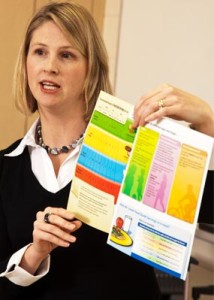If you’ve decided to advance your nursing career by working toward a master’s degree, you may be wondering what types of classes you will take and whether or not you will study nutrition in an MSN (Master of Science in Nursing) program. With over 330 accredited master’s level programs in nursing, and various areas to specialize, clearly there is going to be a lot of diversity in the types of courses taught. Still, there is a good chance that you will study nutrition in some part of your MSN coursework, either as a standalone class or as a topic integrated with other learning.
What to Expect in Your MSN
The MSN degree generally takes between eighteeen months to two years to complete, although some students take longer if they continue to work while a student. The prerequisite for an MSN degree is the BSN. An RN who graduates with an MSN becomes an advance practice registered nurse (APRN) and may work as a nurse practitioner, clinical nurse specialist, certified nurse midwife or nurse anesthetist. Within those different roles, there are also a variety of specializations that require different preparations. For instance, a clinical nurse specialist might work in acute care, geriatrics, pediatrics or a number of other healthcare areas.
The American Association of Colleges of Nursing (AACN) lists nutrition among several important topics that you will likely encounter during your master’s level nursing education. Others include statistics, health policy, ethics, health promotion and family planning.
Nutrition as an Integrated Topic
While you may quite possibly encounter at least a basic introductory level course in nutrition during your MSN studies, it’s also possible that you will study nutrition as an integrated part of other studies. Some of the specific issues you study about nutrition may be specific to the population you may end up caring for. But no matter what your specialty focus is, an essential core element of all master’s level nursing education includes health promotion and disease prevention. You will likely also study about nutrition when you study pertinent body systems such as digestion.
Nurses work in all kinds of settings to provide direct care for patients and also to provide health education. APRNs are trained to assess patient health. Although some healthcare settings employ dieticians or nutritionists, not all do. Regardless, because nurses are often some of the primary healthcare workers that patients come into contact with in settings such as clinics and doctors’ offices, nurses play a very important role in assessing and counseling patients when it comes to nutrition and how it may affect their health and well-being. As APRNs become more prevalent as primary care givers, especially in areas where there are physician shortages, that role may be even more important.
While nutrition will not be the main focus of an MSN degree, it will likely be a component part of any master’s level core studies. In addition to studying nutrition in an MSN, there are professional resources you can utilize to become more knowledgeable about nutrition and nutrition programs that are available in the public health system.




